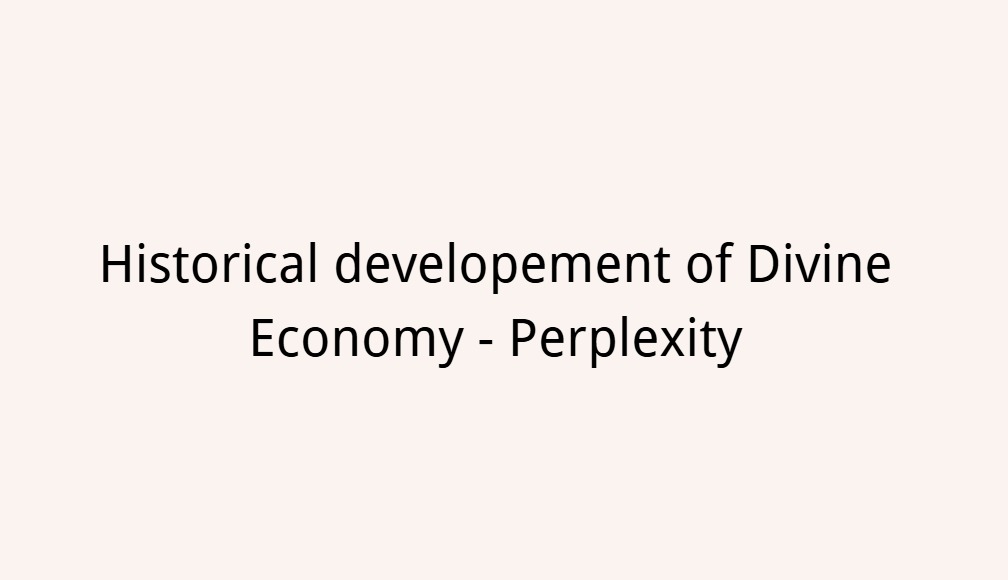The concept of **divine economy** (from Greek *oikonomia*, meaning “household management” or “stewardship”) has undergone significant theological development throughout Christian history, evolving from its early scriptural usage to become a central organizing principle in both Eastern and Western theological traditions.
## Biblical and Apostolic Foundations
The term *oikonomia* appears in **New Testament writings**, where it refers to God’s household administration or management plan[1][2][3]. Paul uses the concept to describe God’s hidden plan of salvation (Ephesians 3:9; 1 Corinthians 2:7-8), while the early apostolic communities understood it as describing God’s stewardship over the mysteries of faith[4]. During this foundational period, the concept encompassed both the divine plan itself and the practical means by which it was administered through the emerging Christian communities.
## Patristic Development (2nd-5th Centuries)
The **early Church Fathers** significantly expanded and refined the theological understanding of divine economy:
**Ignatius of Antioch** (c. 35-108 AD) was among the earliest to use the term theologically, describing Christ’s conception “according to the economy of God”[5]. For him, the divine economy represented God’s positive plan summed up in concepts of life, true life, and eternal life accomplished through Christ’s passion and resurrection.
**Irenaeus of Lyons** (130-202 AD) became known as the “distinguished theologian of the economy”[5]. He used *oikonomia* both as a synonym for the Incarnation and to describe the broader redemptive relationship that results from salvation. His theology of **recapitulation** (*anakephalaiōsis*) must be understood within his emphasis on divine economy—seeing Christ as gathering together all things in himself through “the whole dispensational arrangements”[5]. For Irenaeus, the economy encompassed “the whole plan of God realized through Christ since the beginning of the world, up to its final consummation”[5].
**Origen of Alexandria** was the **first to formally use the term “Economy of Salvation”**[1], though earlier fathers had referenced similar concepts using phrases like “Divine Economy” or “Economy of God.”
**Athanasius of Alexandria** (c. 296-373 AD) employed the concept of divine economy to defend **Trinitarian doctrine**, explaining how the distinct roles of Father, Son, and Holy Spirit in salvation work reflect both unity and diversity within the Godhead[3]. This represented a crucial development in using economic language to articulate orthodox Trinitarian theology.
**The Council of Chalcedon** (451 AD) utilized divine economy concepts in **Christological debates** to explain the coexistence of divine and human natures in Christ, understanding the “economy of salvation” as the means by which God united himself to humanity in Jesus Christ[3].
## Medieval and Byzantine Refinements
In **Eastern Orthodox theology**, the concept of *oikonomia* expanded beyond describing God’s salvation plan to encompass **church discipline and pastoral care**[3]. The principle of *oikonomia* allowed for flexibility in applying church laws, emphasizing pastoral sensitivity and the ultimate goal of salvation. This represented a significant practical application of the theological concept.
## Reformation Era Developments
During the **Reformation period**, theologians like John Calvin and Martin Luther incorporated divine economy concepts into their theological systems:
**John Calvin** (1509-1564) emphasized God’s sovereign *oikonomia* in salvation administration, particularly regarding **election and predestination**[3]. He viewed God’s plan as meticulously ordered, with the Church serving as the primary means for administering divine grace.
**Martin Luther** (1483-1546) connected his understanding of *oikonomia* closely to his **doctrine of justification by faith**[3]. He saw the Church’s role as administering God’s grace through Word and sacraments as the means by which God’s economy of salvation is enacted.
## Theological Evolution and Narrowing
According to Giorgio Agamben’s analysis, the concept of “economy” (*oikonomia*) underwent significant narrowing after the **Nicene Creed was established**[1]. In early Church history, the term encompassed broader “organization of the divine life,” but later became more specifically focused on divine plans of salvation.
## Contemporary Understanding
The historical development reveals that divine economy evolved from a simple administrative metaphor to a **comprehensive theological framework** encompassing:
– **God’s eternal plan** hidden from eternity and revealed through salvation history[2]
– **Trinitarian relationships** and their manifestation in creation and redemption
– **Sacramental theology** as the means through which divine economy operates in space and time[2]
– **Ecclesiological structure** as the institutional embodiment of divine economic principles
This development demonstrates how a basic economic metaphor became one of the most sophisticated theological concepts in Christian tradition, providing a framework for understanding how God’s eternal purposes are worked out historically through creation, incarnation, Church, and sacraments.
Sources
[1] Economy of Salvation – Wikipedia https://en.wikipedia.org/wiki/
[2] Economy, Divine – Encyclopedia.com https://www.encyclopedia.com/
[3] Oikonomia – Video Bible https://www.videobible.com/
[4] The Gift Economy of the Earliest Christians – Yale University Press https://yalebooks.yale.edu/
[5] God’s Economy in Patristic Usage | conversant faith https://conversantfaith.com/
[6] DEVELOPMENT OF NATIONAL ECONOMIES IN THE CONDITIONS OF PANDEMICS http://baltijapublishing.lv/
[7] Ukraine & China: opportunities for development are inexhaustible and the interest is mutual http://skhid.kubg.edu.ua/
[8] Pentecostalism and prosperity : the socio-economics of the global charismatic movement https://www.semanticscholar.
[9] The Genesis of Capitalism: The Nexus between “Politics in Command” and Social Engineering https://www.semanticscholar.
[10] Elias Canetti’s Cities http://www.tandfonline.com/
[11] Century’s End: A Cultural History of the Fin de siècle from the 990’s through the 1990’s . By Hillel Schwartz. New York: Doubleday, 1990. xii + 399 pp. $19.95. https://www.cambridge.org/
[12] The State and Capitalism in Israel, by Amir Ben-Porat. (Contributions in Economic and Economic History, No. 147) 206 pages, preface, tables, bibliography, index. Westport, CT: Greenwood Press, 1993. $55 (Cloth) ISBN 0-313-28149-1 https://www.cambridge.org/
[13] Characteristics of the Development of Early Empires Based on a Comparison of Rome and Qin Han https://www.ewadirect.com/
[14] Development of domestic machine-tool construction industry as one of conditions of the Russian economy technical security http://hmbul.ru/catalog/
[15] The Word-Crucified in the Theology of Aloysius Pieris, S.J. : Pieris’ Contribution to the Development of a Christian Theology of Religions in the Context of Sri Lanka http://ruor.uottawa.ca/handle/
[16] The Divine Economy – by Mark Koyama https://www.markkoyama.com/p/
[17] Drama of the Divine Economy: Creator and Creation in Early … https://www.
[18] Dissertation Spotlight | Divine Accounting: Theo-Economics in the Letter to the Philippians — ANCIENT JEW REVIEW https://www.ancientjewreview.
[19] Topical Bible: The Divine Economy https://biblehub.com/topical/
[20] What is Christian economics? | TheArticle https://www.thearticle.com/
[21] Ethic Economics, Fair Economy, New Economy, Sustainability and other Related Disciplines https://www.cribfb.com/
[22] An Analysis of Economic Wealth of God’s People from Nomadic to Post Exilic Era https://sttintheos.ac.id/e-
[23] Review of Joost Hengstmengel’s Divine Providence in Early Modern Economic Thought. New York, NY: Routledge, 2019, 248 pp. https://ejpe.org/journal/
[24] Voicing God: Theological Injunction to economic issues https://verbumetecclesia.org.
[25] Economics of Genesis: On the Institutional Economic Deciphering and Reconstruction of the Stories of the Bible https://figshare.com/articles/
[26] Economics: A Moral Inquiry with Religious Origins https://dash.harvard.edu/
[27] Sacramental Exchange: Eschatological Economy and Consumption Ritual https://www.mdpi.com/2077-
[28] The Spirit of generosity: a new economic dispensation in the wake of Pentecost? https://ojs.reformedjournals.
[29] Lights, power and the moral economy of early medieval Europe https://onlinelibrary.wiley.
[30] Isaiah 5: A prophetic critique of economic proportion https://verbumetecclesia.org.
[31] Doing Business with the Gods in the Ancient World – Yale University Press https://yalebooks.yale.edu/
[32] Christian economics at the origin https://onlinelibrary.wiley.
[33] [PDF] A Unified Oikonomia: How God’s Economy of Salvation Changes a … https://cbfa-cbar.org/index.
[34] Forging the Divine Economy – Bahá’í Library Online https://bahai-library.com/
[35] Drama of the Divine Economy – Paul M. Blowers https://global.oup.com/
[36] “Economic” Subordination of the Son? Part 1: Theologia and … https://alsoacarpenter.com/
[37] [PDF] Divine Economy: Theology and the Market https://digitalcommons.lmu.
[38] Drama of the Divine Economy: Creator and Creation in Early … https://academic.oup.com/book/
[39] [Common Places] Pro-Nicene Theology: Theologia and Oikonomia https://zondervanacademic.com/
[40] ‘Vertigo’ or ‘Imago’? Nations in the Divine Economy https://www.




